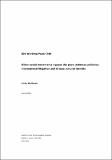| dc.description.abstract | This paper examines citizen mobilisation and activism in relation to asbestos disease and litigation.
Although the litigation of Cape plc, a British company mining asbestos in South Africa, has been seen as a
success story in which local activists worked alongside international lawyers and environmental
campaigners to force Cape plc to pay compensation to 7,500 former employees with asbestos-related
diseases, many claimants experienced this case as a bitter defeat. The paper explores these divergent
interpretations of the same litigation case, focusing on the experiences of two towns in the Northern Cape,
South Africa, namely Prieska and Griquatown and on the claimants’ perspectives. The literature of social
movements, political mobilisation, ethnic identity and millenarian movements is drawn upon in relation to
the everyday economic and cultural experiences of people in these Northern Cape towns. In contrasting
the relative isolation experienced by Griquatown residents with the networking and mobilisation process
taking place in Prieska, the paper argues that this isolation undermines citizens’ ability to frame asbestos
disease litigation as an international victory and as a case of justice being done. Instead claimants interpret
their experiences in terms of local factors, including poverty, the history of asbestos payment, religious
beliefs and, ultimately, in an idiom that corresponds with their ethnic identity. The paper thus suggests
that neither theories of social mobilisation nor millenarian movements alone can adequately explain
people’s emic interpretations of international litigation and political mobilisation. Rather, it is the linkages
between these literatures, informed by an understanding of local ethnic identity, which provides a
framework for understanding social behaviour. | en_GB |

